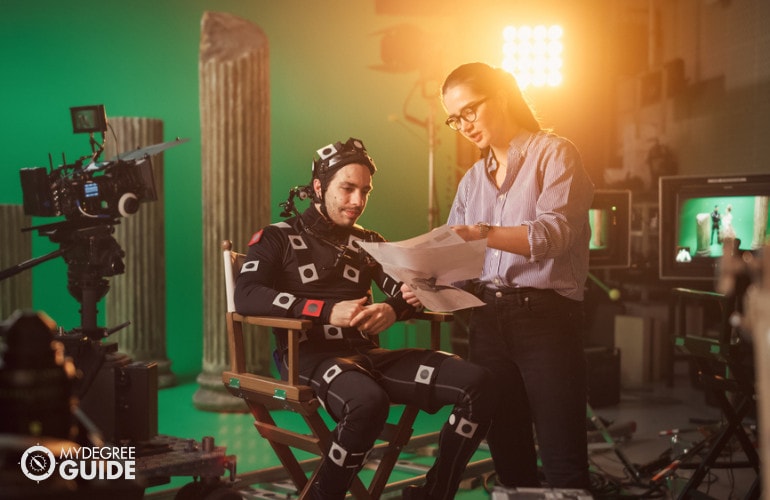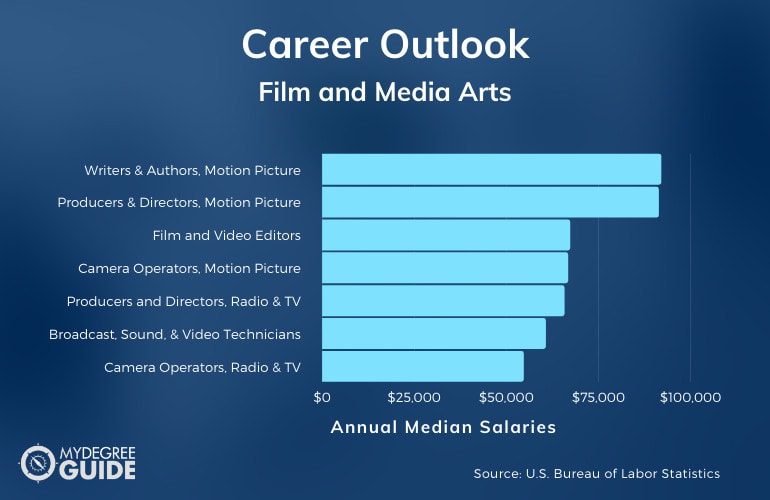An online film degree can help you pursue your passion for the art of visual storytelling. You can learn the details about how films are made, the history of the film industry, and how to analyze films critically.

Some programs even provide opportunities for you to work on your own projects and receive feedback from instructors and peers.
Editorial Listing ShortCode:
Read on for more details about pursuing a film degree online, from choosing a program to planning a career path.
Universities Offering Online Bachelors in Film Degree Programs
Methodology: The following school list is in alphabetical order. To be included, a college or university must be regionally accredited and offer degree programs online or in a hybrid format.
Academy of Art University
The Academy of Art University offers an online Bachelor of Fine Arts in Motion Pictures and Television degree program. To graduate, students must complete 132 credit hours with a minimum GPA of 2.0. To be eligible for the program, applicants must submit official transcripts with their online applications.
Academy of Art University is accredited by the WASC Senior College and University Commission.
Arizona State University
Arizona State University offers an online program for a Bachelor of Arts in Film and Media Studies. Students must complete 120 credit hours to graduate. Each of the online classes is 7.5 weeks long. Applicants must have a GPA of 3.0 or higher and appropriate ACT or SAT test scores to be eligible for the program.
ASU is accredited by the Higher Learning Commission.
Columbia College
Columbia College offers a Bachelor of Fine Arts degree in Visual Effects. Students must complete 192 credit hours to graduate. They may add an emphasis in Animation, Compositing, or Digital Modeling. Those interested in the program may apply online through the school’s website. An admissions counselor may be contacted at any point during the application process.
Columbia College is accredited by the Higher Learning Commission.
Grand Canyon University
Grand Canyon University offers a Bachelor of Arts in Digital Film with an emphasis in Production. Students must complete 120 credit hours to graduate. Each class is 7 weeks long. To be eligible for the program, applicants must submit official transcripts with their admissions forms.
Grand Canyon University is accredited by the Higher Learning Commission.
Maharishi International University
Maharishi International University offers a Bachelor of Arts in Cinematic Arts and New Media. The online classes range from 4 to 8 weeks long. Students in the program are expected to complete an internship and a portfolio. Those interested in the program must have a GPA of 2.5 to be eligible.
MIU is accredited by the Higher Learning Commission.
Miami International University of Art and Design
Miami International University of Art and Design offers an online Bachelor of Fine Arts in Digital Filmmaking and Video Production. Students must complete 180 credit hours to graduate. Those interested in the program must submit an online application with either official high school transcripts or a high school equivalency certificate.
Miami International University of Art and Design is accredited by the Southern Association of Colleges and Schools Commission on Colleges.
National University
National University offers a Bachelor of Arts in Digital Media Design. Students must complete 180 quarter credit hours and a capstone project to graduate. The online classes are 4 weeks long. Applicants may apply online through the school’s website. To be eligible for the program, applicants must have a GPA of 2.0 or higher.
National University is accredited by the WASC Senior College and University Commission.
University of Massachusetts – Amherst
The University of Massachusetts—Amherst offers a Bachelor of Arts degree with a concentration in Film and Media Studies. Students may transfer in up to 105 credit hours for qualifying prior coursework, portfolios, or credit exams. Applicants must have at least 12 credit hours to transfer into the program and a minimum GPA of 2.0.
The University of Massachusetts Amherst is accredited by the New England Commission of Higher Education.
University of Montana
The University of Montana offers an online Bachelor’s in Media Arts program. Students must complete 121 credit hours to graduate.
Those interested in the program may apply online with copies of official high school transcripts that include their GPA. Advanced Placement options are available for applicants who wish to obtain credits for the knowledge they already have.
The University of Montana is accredited by the Northwest Commission on Colleges and Universities.
Wilmington University
Wilmington University offers a Bachelor of Science in Video and Motion Graphics with a concentration in Digital Marketing. Students must complete 129 credit hours and an internship to graduate. Applicants must submit official transcripts from all schools they’ve attended. Placement tests in math and English must be taken after being accepted.
Wilmington University is accredited by the Middle States Commission on Higher Education.
Online Film Degrees

An online film degree can teach you about everything that goes into the process of making a digital film, from start to finish. You can also study the technology and processes behind the making of other types of media and entertainment, including television shows, news broadcasts, and mobile apps.
Online film programs often provide a collaborative environment and use online learning platforms that facilitate student interactions and discussions. Talking with other students can help you develop a fresh perspective on your creative work. It can also help prepare you to work in an industry in which large teams have to work together in a coordinated manner.
Common subjects to study in a film major include:
- Video editing
- Screenwriting
- Audio production
- Lighting
- Producing
- Directing
While the most obvious career path for people with degrees in film is to pursue work in the film industry, you could also learn skills that are useful in other fields.
For instance, skills in camera usage, video editing, or producing are also applicable in the television news industry. A film degree program can also help you develop analytical and writing skills. Some graduates go on to pursue writing jobs for newspapers or magazines, especially if they want to write entertainment or movie reviews.
Common Bachelors in Films Concentrations

Many film degree online programs allow you to choose a concentration. This can make your education more specialized to your particular interests and career goals. Here are examples of concentrations that may be available at an online film school:
- Film Studies. With a film studies concentration, you can study the history of film, how films vary in different cultures, and how to analyze and critique films.
- Film Production. With a film production concentration, you can study technical and aesthetic elements of film as well as how to use them to tell a story.
- Film Directing. With a film directing concentration, you can learn the hands-on and technical skills needed to provide leadership in the making of a film.
- Film Editing and Post Production. With a film editing and post production concentration, you can learn how to use different editing systems and software to create a high-quality product.
- Cinematography. With a cinematography concentration, you can study an artistic approach to visual imagery in film, learning how to work with cameras and lighting.
- Producing. With a producing concentration, you can study business strategies and organizational skills that are useful in the filmmaking industry. You can also learn about the distribution process of different media formats.
You’re likely to come across dynamic and engaging coursework in any of these film concentrations.
Film and Media Arts Careers & Salaries

Knowledge and skills learned from a film degree are often most relevant to people who want to work as directors, producers, camera operators, film and video editors, or broadcast, sound, or video technicians.
According to the Bureau of Labor Statistics, here are some different occupations related to the study of film, along with their median annual salaries.
| Careers | Annual Median Salaries |
| Writers and Authors, Motion Picture and Video Industries | $91,960 |
| Producers and Directors, Motion Picture and Video Industries | $91,300 |
| Film and Video Editors | $67,250 |
| Camera Operators, Motion Picture And Video Industries | $66,700 |
| Producers and Directors, Radio and Television Broadcasting | $65,720 |
| Broadcast, Sound, and Video Technicians in Motion Picture and Sound Recording Industries | $60,650 |
| Camera Operators, Radio and Television Broadcasting | $54,660 |
| Sound engineering technicians | $53,520 |
| Audio and Video Technicians | $47,920 |
| Broadcast Technicians | $43,570 |
The majority of directors and producers work in motion picture and video industries as well as the radio and television broadcasting industry. Many are also self-employed. Most broadcast, sound, and video technicians work in radio and television broadcasting. Many work in the motion picture and sound recording industries as well.
Many camera operators and film and video editors are actually self-employed. Others tend to work for motion picture and video industries or in television broadcasting.
Bachelor of Film and Television Curriculum & Courses

Here are examples of courses you might take while earning a bachelor’s degree in film:
- Digital Literacy: You’ll study forms of entertainment and media online and learn how the Internet has affected the distribution of entertainment and media.
- Behavioral Science: You’ll learn to analyze human decision-making and communication processes.
- Independent Filmmaking: You’ll learn about movies that are made outside of the major film studio system.
- Editing: You’ll learn how to work with different types of video editing software.
- Screenwriting: You’ll study how to write stories for a film or television format.
- Digital Audio Production: You’ll learn about the auditory aspects of film.
- Cinematography and Lighting: You’ll study the different effects that can be created with lights.
- Location Scouting: You’ll learn about how to find and choose locations for filming different types of settings.
- Directing: You’ll study how to provide direction to others and coordinate the work of a team within the filmmaking process.
- Color Correction and Grading: You’ll study how to make colors in a film footage appear natural and realistic and how to work with color artistically to create mood and atmosphere.
Exact course titles and requirements will vary among different programs.
How to Choose an Online Degree in Film Program

Here are some factors you may want to consider when choosing an online degree program in film:
- The focus of the program. Some programs are more academic in nature, focusing on intellectual analysis and criticism. Other programs tend to focus more on practical skills related to making movies, such as screenwriting, video editing, and cinematography.
- Available concentrations and electives. Regardless of the overall focus of any given program, it may offer options for customization through the availability of various concentrations and electives within the major.
- Scheduling options. Some online degree programs do not have set class times, while others do.
There are many different programs available, so it’s helpful to look for ones that best suit your learning preferences and career goals.
Bachelor in Film Admissions Requirements

Here are some common admissions requirements for bachelor’s degree programs in film:
- High school diploma or GED
- Minimum GPA of 3.0, on average
- Personal essay describing your career goals
Admissions requirements can vary widely at different schools. Some schools also request letters of recommendation or SAT or ACT test scores. Schools may ask prospective film students to submit portfolios as well.
Accreditation

If you visit the websites of different colleges and universities, you may notice that most of them describe themselves as being accredited by one agency or another.
Regional accreditation agencies examine colleges and universities to ensure that they meet certain standards and provide quality educational services and resources to their students. If you enroll in a school that’s recognized by a credible accrediting agency, your credits are more likely to transfer. The accreditation status of your school can also influence your eligibility to receive financial aid.
For more information about regional accreditation, you can visit the US Department of Education.
Financial Aid and Scholarships

If you’re concerned about the expenses associated with earning a college degree, there are many forms of financial aid that are available to students who qualify.
Financial aid opportunities include state aid and federal aid, employer programs, and scholarships from your university or a professional organization. You can check with the schools you’re interested in to find out what scholarship opportunities they have available.
To apply for federal financial aid, you can fill out the Free Application for Federal Student Aid (FAFSA).
Should I Go to Film School?

There is no right or wrong answer to this question. A bachelor’s degree in film may be a good fit for you if you’re passionate about the art of film and want to study film and filmmaking techniques at a high level.
Film school often provides opportunities for you to make a showreel displaying your work. Going to film school can also give you the opportunity to learn and collaborate with others. Film majors can also have the chance to enter projects in the student categories of film festivals.
What Can I Do with a Film Degree?
Common film career paths include producer, director, film and video editor, camera operator, and broadcast, sound, and video technician. Some film majors are also interested in a career in film criticism, photography, animation, or illustration.
A degree program in film can help you develop skills that are useful in pretty much any field that involves visual storytelling. There are many career opportunities related to film that provide flexible scheduling and the ability to work as a contractor or freelancer.
How Long Does It Take to Get a Bachelor’s Degree in Film Online?

A traditional bachelor’s degree program is usually structured with16 weeks semesters, and you can typically finish in 4 years if you are enrolled in school full-time.
Some online degree programs provide accelerated options, in which classes last just 8 weeks. Following this academic calendar may allow you to finish your degree sooner with full-time, year-round enrollment. Alternatively, enrolling part-time can give you more flexibility in your schedule, but it may take you longer to finish your program.
What’s the Difference Between a BA vs. BFA in Film?
Here are some differences between a Bachelor of Arts (BA) and a Bachelor of Fine Arts (BFA) in Film:
| BA in Film | BFA in Film |
|
|
Either type of film degree program can give you a rigorous film education.
What’s the Difference Between Videography vs. Filmmaking?
Here are some differences between videography and filmmaking.
| Videography | Filmmaking |
|
|
If you attend a degree program in filmmaking, you may study videography as part of your curriculum.
Is a Film Degree Worth It?
Yes, a film degree is worth it for many students. Film careers are in high demand, and the industry is seeing well above average growth.
According to the Bureau of Labor Statistics, employment of broadcast, sound, and video technicians is expected to grow 21% over the next decade. Employment of film and video editors is expected to grow 33%, and camera operators, producers, and directors are expected to see 24% job growth.
Getting Your Bachelor’s in Film Online

If you are hoping to develop your creative voice and learn the ins and outs of how movies are made, you may want to consider getting a bachelor’s degree in film.
There’s a wide variety of degree programs available, including online options that may allow for more flexible scheduling than traditional on-campus classes. There are also many film concentrations you can choose from, such as cinematography, production, and editing and post-production. In fact, some students decide to specialize and earn either an on-campus or online cinematography degree.
You can start your educational journey today by exploring accredited universities that offer film programs and concentrations that align with your personal interests.
